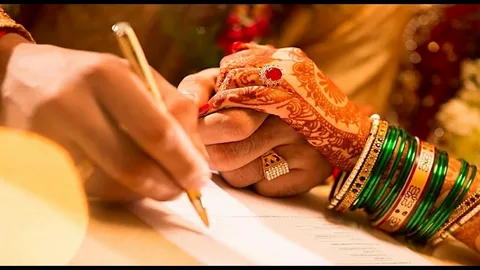Court marriage in Pakistan is becoming increasingly popular among couples who seek a simple, lawful, and cost-effective alternative to traditional weddings. Unlike conventional weddings, court marriage provides legal protection to both partners and is conducted under the umbrella of Pakistani family laws. If you’re considering this option, understanding the court marriage procedure in Pakistan, applicable laws, and required documentation is essential. This article breaks down everything you need to know.
What is Court Marriage in Pakistan?
Court marriage in Pakistan refers to a legal union between a consenting adult male and female performed in the presence of a legal authority—typically a lawyer and a registered Nikah Khawan (marriage officiant). This type of marriage follows the rules and regulations outlined in Pakistani law, particularly the Muslim Family Laws Ordinance 1961 and Marriage Act 1872 for non-Muslims.
Whether you are marrying for love, bypassing family constraints, or simply opting for a hassle-free process, court marriage in Pakistan offers a reliable legal solution that is increasingly recognized across all cities including Lahore, Karachi, Islamabad, and Rawalpindi.
Court Marriage Law in Pakistan
To fully understand court marriage law in Pakistan / Online Marriage In Pakistan, it’s important to know the legal prerequisites:
Age of Consent: The male must be at least 18 years old, and the female must be 16 (as per the Muslim Family Laws Ordinance). However, most courts now prefer the bride to be 18, in line with child protection regulations.
Free Will: Both parties must marry of their own free will without coercion or undue pressure.
Mental Soundness: Both individuals must be of sound mind to understand the implications of marriage.
Marital Status: Neither party should be married already unless the male seeks court permission for a second marriage.
The court marriage law in Pakistan ensures protection under the Constitution of Pakistan, guaranteeing the right to marry and choose one’s life partner. Article 35 of the Constitution safeguards marriage and the family unit.
Court Marriage Procedure in Pakistan
The court marriage procedure in Pakistan is simple and can usually be completed in a single day. The steps involved are:
Legal Consultation
Meet a legal expert who specializes in family law. The lawyer will guide you through the required documentation and answer any legal questions you might have.
Document Verification
Submit original documents for verification. These include CNICs, photographs, and an affidavit confirming free will.
Nikah Ceremony
A registered Nikah Khawan conducts the Nikah in the presence of two Muslim male witnesses. The bride’s consent is obtained through a Wakil (lawyer or appointed representative), especially if she is not physically present.
Registration
The marriage is registered officially, and the couple receives a computerized Nikah Nama (marriage certificate) along with an affidavit of free will from the bride.
Affidavit & Court Protection
To ensure protection from any family or societal backlash, the couple may request protection from the court. This helps in cases where family members might attempt to take unlawful action.
This structured court marriage procedure in Pakistan ensures legal and constitutional compliance, making the union fully recognized under Pakistani law.
Documents Required for Court Marriage in Pakistan
Here’s a list of documents required for court marriage in Pakistan:
For Both Parties:
- Original CNICs (or B-Form with Nadra token for those under 18)
- 4 passport-sized photographs each
- Affidavit of free will (for the bride)
- Copy of CNICs of two male witnesses
- Divorce decree or death certificate if previously married
For Non-Muslim Couples:
- Baptism certificates (for Christians)
- Proof of single status
These documents required for court marriage in Pakistan must be authentic and up to date. Your lawyer will ensure that all forms are correctly filled out and submitted.
Advantages of Court Marriage in Pakistan
There are several reasons couples opt for this legal process:
Simplicity and Speed
The process is completed within a day or two, avoiding the complexity of traditional weddings.
Legal Protection
Both parties enjoy full legal protection under the law, with court documents as evidence.
Privacy
Many couples choose court marriage for privacy. There is no need for elaborate functions or extended family involvement.
Cost-Effective
Court marriage is economical compared to expensive traditional ceremonies.
Common Misconceptions
Many people misunderstand court marriage in Pakistan due to cultural taboos. Let’s clarify a few points:
- Myth: Court marriage is illegal.
Fact: Court marriage is completely legal and protected by Pakistani law. - Myth: You must inform parents.
Fact: Adults can marry without parental permission, provided it’s consensual. - Myth: Court marriage is only for runaway couples.
Fact: Many educated and professional couples choose court marriage for convenience and privacy.
Legal Protection After Court Marriage
Following the court marriage procedure in Pakistan, you gain several legal rights:
- Right to live together without interference
- Right to protection from threats or harassment
- Right to register and obtain legal documents such as a Nikah Nama and marriage certificate
- Right to inherit and make claims as legal spouses
If your family disapproves or takes coercive action, you can file for protection under the Criminal Procedure Code (CrPC) and constitutional remedies.
Final Thought
Choosing court marriage in Pakistan is a bold yet entirely legal step for couples seeking a dignified and secure way to tie the knot. With a clear understanding of the court marriage procedure in Pakistan, supportive court marriage law in Pakistan/ Nikah Khawana, and proper documentation, couples can begin their married life on a strong legal foundation. The simplicity, legality, and privacy that court marriage offers make it a viable option for modern couples across the country.
Make sure to consult a professional lawyer to ensure that all documents required for court marriage in Pakistan are complete and correct. Whether it’s your first step toward independence or a decision based on mutual respect and love, court marriage is a legally sound and empowering choice for adult couples in Pakistan.
FAQs
Can we do court marriage without informing our families?
Yes. Pakistani law allows adult individuals to marry of their own free will without family consent.
Is court marriage recognized internationally?
Yes. With a properly registered Nikah Nama and legal affidavit, court marriages are recognized globally.
How long does the court marriage process take?
If all documents are ready, it can be completed within 1–2 working days.
What if the girl is under 18?
Legally, she must be 16 according to the Muslim Family Laws Ordinance, but most courts require her to be 18 in practice.
Can non-Muslims do court marriage in Pakistan?
Yes. Non-Muslim marriages are conducted under the Marriage Act 1872 with additional religious documentation.




































